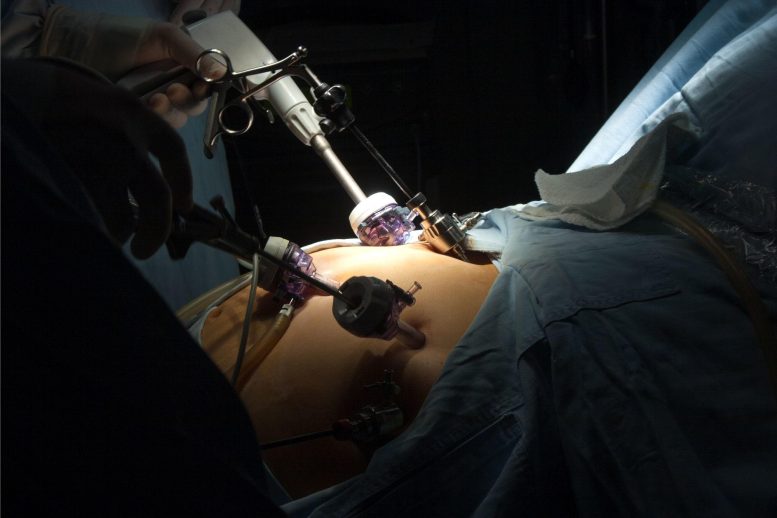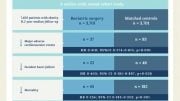
A new study suggests that the most significant metabolic changes after gastric bypass surgery occur immediately post-operation, with many metabolic markers returning to pre-surgery levels within a year. Though many patients experience initial weight loss and diabetes remission, these benefits may not be as long-lasting as previously believed.
A recent study conducted by Lund University in Sweden raises questions about the efficacy of bariatric operations involving gastric bypass. According to the study’s findings, the most significant metabolic changes occur immediately following the surgery. However, just one year post-operation, the levels of metabolites and fats in patients were observed to return to almost the same levels as before the procedure.
Earlier research has indicated that the majority of gastric bypass patients experience weight regain within five years following the operation. The metabolic effects of bariatric procedures on patients remain uncertain, as this aspect has not yet been conclusively established. In this new study, which has been published in the journal Obesity, researchers closely examined the metabolism of overweight individuals both before and after undergoing a gastric bypass procedure.
The study shows that the biggest changes happened straight after the procedure. One year later, the concentration of metabolites and fats among all the participants was nearing the same levels as before the operation.
“Just following up on the weight of people can be a blunt instrument for studying the effects of the procedure. Our study provides a greater understanding of what happens to the metabolism in connection with a gastric bypass operation,” says Peter Spégel, associate professor of molecular metabolism at Lund University, who led the study.
Rapid changes
The study was based on data from 148 people with and without type 2 diabetes who underwent a gastric bypass operation in Sweden. Blood samples were collected from participants just before the procedure and on at least two occasions after the operation. Their body mass index (BMI) was measured before the operation and on three occasions afterward.
The researchers conducted detailed analyses of fats and metabolites in the blood. Just one year after the operation, some of the participants were back at exactly the same levels as before the surgery, whereas the reversion was not as marked for others.
“We could see the changes while the participants still had a low BMI after the operation. By studying metabolism, we can obtain a clear indication that unhealthy changes are on the way. We hope that the knowledge can be used in follow-up so that preventive measures can be put in place,” says Nils Wierup, professor of neuroendocrine cell biology at Lund University and one of the main authors of the article.
Increased risk of type 2 diabetes
The levels of certain polyunsaturated fats increased straight after the operation to then fall and approach the same levels as previously. Polyunsaturated fats are essential and can reduce the risk of cardiovascular disease. The study also showed a reduction in the concentration of a certain type of amino acids after the operation and then a subsequent rise. The levels of these amino acids are usually high in individuals with insulin resistance and carry an increased risk of developing type 2 diabetes.
“One conclusion we draw is that the risk of developing type 2 diabetes is considerably reduced after the operation among individuals who do not have the disease, but one year later we see an increased risk again. Among individuals who already had type 2 diabetes at the time of the surgery, we see a remission of the disease, but the risk of the disease returning then increases over time,” says Peter Spégel.
The benefit of bariatric operations
Individuals who undergo surgery for obesity need to lose weight before the operation by means of a diet. A previous study by the same research team examined the effects of a low-calorie diet and a gastric bypass operation separately. The study showed that the diet had the biggest effect on metabolism, whereas the surgery led to quite small changes. The researchers’ latest study now shows that for many people, the positive effects on metabolism subside as soon as one year later.
“We need more and larger studies in order to draw reliable conclusions. One advantage of bariatric operations is that a majority of people with type 2 diabetes see a remission of their disease afterward. And even though a large percentage of individuals who undergo this procedure gain weight afterward, it’s usually not a return to the same weight as before. In the future, we want to take a closer look as what happens to metabolism on an individual level, as this can vary,” concludes Nils Wierup.
Reference: “Metabolic remission precedes possible weight regain after gastric bypass surgery” by Oksana Rogova, Katharina Herzog, Mahmoud Al-Majdoub, Michael Miskelly, Andreas Lindqvist, Louise Bennet, Jan L. Hedenbro, Nils Wierup and Peter Spégel, 16 August 2023, Obesity.
DOI: 10.1002/oby.23864









First writing the US FDA (with replies) about connections I personally observed between allergies, added MSG, chronic disease and obesity in October of 2005 (obviously, now, in-vain) I’ve now written more than 3,000 intended recipients (including some at Lund University, citing other sources and updating as possible) with similar results; in-vain. Simply put, from the perspective of a now senior lay male American victim, investigator and discoverer, in persons of reasonable diet and lifestyle obesity is the most obvious common symptom of long-term (e.g., months to decades; highly individual; many individual variables) undiagnosed nearly subclinical non-IgE-mediated food allergies aggravated (or not) with officially (FDA in the US) approved food poisoning (e.g., namely added ‘cultured-free’ MSG and common allergen soy). Clearly, to me, gastric bypass surgery is merely a symptomatic treatment for obesity, not a cure.
I’ve personally witnessed 3 different people (none of them related to each other or myself) get gastric bypass surgery and go full circle.
Have surgery.
Loose most/all excess weight.
Slowly return to same eating habits and amounts. Guess they stretch out whatever they have left.
Gain all, and sometimes more, weight back.
Any weight loss surgery is only treating a symptom and not the cause.
Biggest scam there is and it makes billions every year which is why they dont care if the surgery is effective long term.